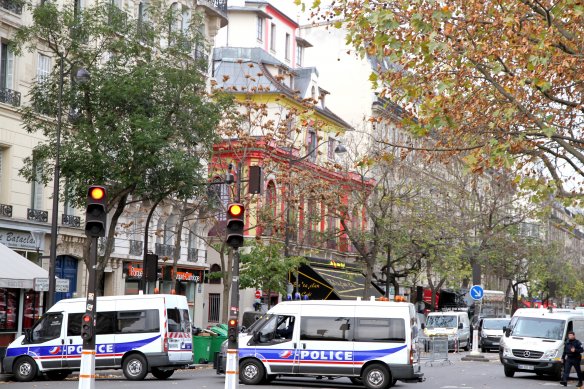For more than a decade, alarmists have essentially argued that, because the 9/11 attackers proved to be good with box-cutters, they would soon be able to fabricate nuclear weapons.
And now, after the dramatic and horrible Paris terror attacks, a similar process of alarmed exaggeration seems to be happening with ISIS. In a reactive pose that has become routine for it, the group has claimed responsibility for — or, more accurately, boorishly celebrated — the tragic venture.

French police gathering evidence at the Bataclan theatre on 14 November. Photo: Maya-Anaïs Yataghène
In fact, whatever its degree of complicity in the Paris attacks, ISIS does not deserve credit for great military prowess. Its ability to behead defenseless hostages certainly should not be taken to suggest that. And its major military advance, the conquest of the city of Mosul in Iraq last year, was essentially a fluke. Its idea was to hold part of the city for a while in an effort, it seems, to free some prisoners. The defending Iraqi army, “trained” by the American military at enormous cost to US taxpayers, simply fell apart in confusion and disarray, abandoning weaponry, and the city, to the tiny group of seeming invaders.
After its fortuitous advances of 2014, the vicious group’s momentum has been substantially halted, and its empire mostly built on desert sand is currently under a form of siege. It has alienated just about everybody, and, on close examination, its once highly-vaunted economic capacity—selling a lot of oil and antiquities—may end up proving to be as illusory as its military prowess. And it has to work hard to keep people from fleeing its lumpen Caliphate. (As we are constantly reminded, however, its ability to Tweet remains strong.)
With that condition in place, it seems wise and appropriate to consider a recent proposal by Ambassador James Dobbins. In this, the siege of ISIS would continue while the many foreign suppliers of the war in Syria would pressure their clients on both sides to establish a cease fire. This would be a decidedly difficult diplomatic undertaking, and it would leave Syrian President Bashar Assad in office at least for the time being. But Dobbins, joining specialist Graham Fuller, stresses bluntly that “any peace in Syria is better than the current war.” After the shooting declines, the primary military focus would shift to ISIS. The Obama administration seems to be gradually moving in this direction.
The country would be effectively partitioned, perhaps for years as difficult negotiations take place. But it would put an end to the bulk of the fighting—which currently seems mostly to consist of minor turf shifts and of the mindless lobbing of ordnance on civilian areas, a process that mainly creates refugees.
In recent statements, Assad seems essentially to have accepted something like this. And the Russian intervention may just possibly begin to convince straw-grasping insurgents that they can’t win militarily.
In time, in its main areas ISIS would be “degraded and ultimately defeated” in President Barack Obama’s phrase. The best approach for achieving this outcome may be to facilitate the group’s self-destruction rather than relying heavily on direct, and often counterproductive, military measures.
However, ISIS could still provide inspiration to death cult sycophants around the world even if it essentially fails to exist. And, as the Paris attacks tragically demonstrate, potential targets for dedicated terrorists—peaceful aggregations of civilians—remain legion.
On the other hand, the number of people killed since 2001 by Muslim extremist terrorists in the entire world outside war zones has been some 200-400 per year. That’s 200-400 too many, of course, but it does not present a challenge that is existential. The Paris experience should not be taken to suggest that the numbers and lethality of attacks outside of war zones will necessarily greatly and permanently rise. Nor that military efforts to deal with the terrorism hazard must be massively increased.
- This is an updated and expanded version of a text which was first published in Time Magazine. A Norwegian version of the text was published in Norwegian at Ytring 24 November 2015: ‘IS ingen militær trussel‘
- John Mueller gave the PRIO Annual Peace Address 2015, on The Dangers of Alarmism. Watch the video here or read the Address here.